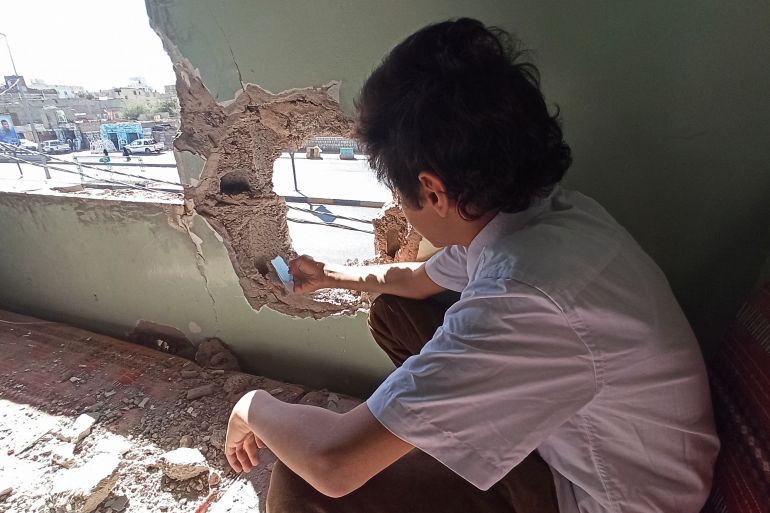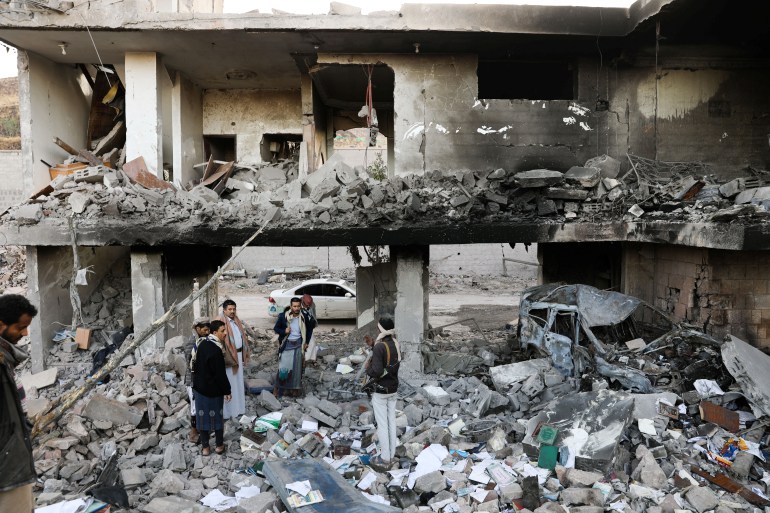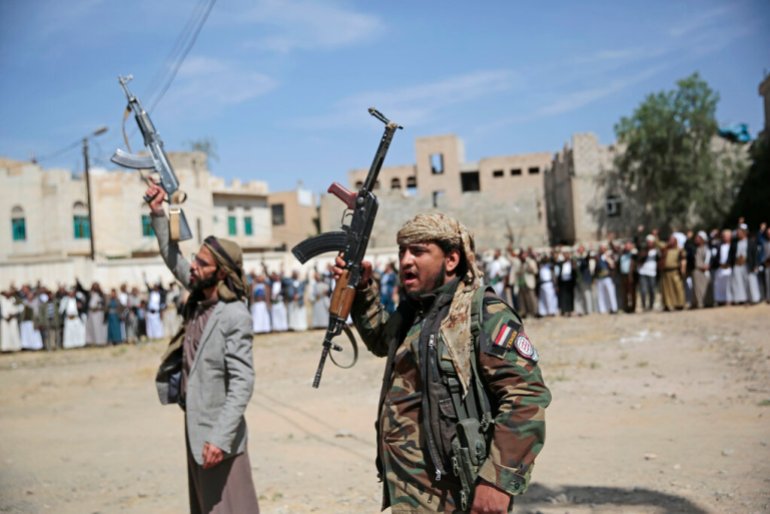Rights groups warn Biden against re-blacklisting Yemen’s Houthis
Labelling rebels ‘terrorists’ would disrupt flow of aid and basic goods to war-torn Yemen, advocates warn US president.

Washington, DC – When the Biden administration revoked the “terrorist” group label from Yemen’s Houthi rebels last February, it cited the potentially “devastating” effects that the designation would have on Yemeni civilians’ access to life-saving humanitarian aid.
But less than a year later, President Joe Biden has said re-designating the group is “under consideration“, a move advocates and rights groups say is not only disappointing but dangerous.
Keep reading
list of 4 itemsYemen civilians bear the brunt of escalating Houthi-UAE conflict
Saudi-led coalition announces probe into Yemen prison attack
‘A war crime against humanity’: Yemen rebels denounce attack
“It’s extremely disappointing that the Biden administration is considering this position when they know very well the humanitarian impact it would have,” Scott Paul, senior manager of humanitarian policy at Oxfam America, told Al Jazeera.
“A year ago, the administration heeded our warnings – and nothing has changed since then to improve the outlook for what these designations would mean.”
The United Arab Emirates openly requested that the US re-blacklist the Houthis after the rebels carried out missile and drone attacks against Abu Dhabi on January 17, killing three people.
Days later, during a news conference on January 19 to mark his presidency’s one-year mark, Biden said reinstating the designation was “under consideration” but added “it’s going to be very difficult” to end the conflict in Yemen.
The Emirati embassy in Washington, DC, welcomed Biden’s pledge.
Risk of starvation
But to activists calling for an end to the years-long war in Yemen, the United States president’s remark is a betrayal of his election promise to work to end the conflict – and break from the policies of his predecessor Donald Trump, who provided uncritical support to the Saudi-led coalition.
That US-backed coalition, which included the UAE, intervened in Yemen in 2015 to push back the Houthis, who had taken over most of the country, including the capital Sanaa, and to restore the Gulf-backed government of Yemeni President Abd-Rabbu Mansour Hadi.
The war has brought Yemen to the verge of famine, sparking what the United Nations has said is the worst humanitarian crisis in the world.
“The designation [of the Houthis] would starve millions of Yemenis and he [Biden] knows that,” said Iman Saleh, general coordinator of the Yemeni Liberation Movement, an anti-war advocacy group in the US. “A designation would make him no different from Trump.”
Saleh, who went on a hunger strike near the White House last year to demand an end to the Saudi-led coalition’s aid as well as the removal of a sea and air blockade on Yemen, also criticised the US administration’s stance of solely blaming the Houthis for prolonging the war. “It’s time for Biden to stop these games and fulfill his campaign promise: end the war in Yemen,” she told Al Jazeera.

Democratic pressure
Amid Democratic Party legislators’ fury over Trump’s close ties with Riyadh, nearly all of the party’s presidential candidates, including Biden, promised during the 2020 election campaign to end US support to the Saudi-led coalition.
Last February, just weeks into his presidency, Biden announced an end to American assistance for Saudi Arabia’s “offensive operations” in Yemen, as well as “relevant arms sales”.
But he reaffirmed his commitment to the kingdom’s security, and last year Biden’s administration greenlit a $650m sale of air-to-air missiles to Riyadh, as well as a $500m helicopter maintenance deal, drawing rebuke from some rights activists.
On Thursday, Brett McGurk, the White House’s National Security Council coordinator for the Middle East, appeared to lay the blame for ongoing violence in Yemen squarely on the Houthis.
“There have been a number of ceasefire initiatives on the table; the Houthis have refused to engage,” McGurk said during a virtual address at the Carnegie Endowment for International Peace, a think tank in Washington, DC.
The Houthis last year rejected a US-backed Saudi proposal for a ceasefire, insisting that lifting the blockade, including reopening Sanaa airport, is a prerequisite for ending the war.
Hassan El-Tayyab, legislative director for Middle East policy at the Friends Committee on National Legislation advocacy group, said the US administration’s position ignores “devastating impacts of the Saudi blockade” on Yemen.
El-Tayyab also warned that re-designating the Houthis would make it more difficult to end the conflict.
“While the Houthis share much of the blame, alongside the Saudi-led coalition for human rights violations in Yemen, a foreign terrorist designation would do nothing to address those concerns,” he told Al Jazeera. “It would, however, prevent the delivery of critical humanitarian assistance to millions of innocent people and greatly hurt the prospects for negotiated settlement.”
‘Will cost lives’
The Houthis are the de-facto authorities in much of northern Yemen, where they control local governance and basic state functions. Humanitarian aid groups have said blacklisting the rebels would raise the risk they could incur US sanctions should they provide assistance and much-needed essential commodities to aid-dependent Yemenis living in the area.
“After years of conflict, many Yemenis are already living on the brink and they cannot afford to pay even higher prices, for food, fuel, medicine and other necessities,” Paul, of Oxfam America, told Al Jazeera in an email. “Imports would be disrupted and the flow of aid would decrease. The decision to list the Houthis will absolutely cost lives in Yemen.”
Still, the UAE and foreign policy hawks in Washington continue to push for a designation.
“Close UAE-US cooperation helped to repel another round of Houthi terror attacks this morning in the UAE,” the Emirati ambassador to the US, Yousef Al Otaiba, said via his embassy’s Twitter account on Monday. “Next step is to shut off financial and arms flows from their backers. US should move now to put the Houthis back on the terrorist list.”
Ambassador Al Otaiba: “Close UAE-US cooperation helped to repel another round of Houthi terror attacks this morning in the UAE.
Next step is to shut off financial and arms flows from their backers. US should move now to put the Houthis back on the terrorist list.”
— UAE Embassy US (@UAEEmbassyUS) January 24, 2022
Several Republican US senators also introduced a bill to re-designate the Houthis this week, with Ted Cruz accusing Biden of appeasing Iran, which the Saudi-led coalition accuses of being behind the Houthis – a charge both the Yemeni rebels and Tehran deny.
“US policy in Yemen currently amounts to nothing more than documenting Houthi violence, which has escalated since Mr. Biden took office,” officials from the hawkish Foundation for Defense of Democracies think tank wrote in the Wall Street Journal on January 25.
“Moreover, the administration’s actions have undermined the basis of the American terrorism sanctions regime. Ansar Allah [the Houthi group] is the textbook definition of a terrorist group. If it can have its sanctions lifted without changing its behavior, why can’t other terrorist organizations do the same?”
The process
While Congress can pass legislation to compel the president to blacklist a foreign organisation as a “terrorist” group, the issue – like most foreign policy matters – is largely under the purview of the executive branch. The US president’s top aides – namely the secretary of state – have the legal authority to designate groups as “terrorists” and to revoke such designation.
Labelling a group as an FTO must meet three standards, according to the State Department – the organisation has to be foreign; it must engage in “terrorist” activity as defined by US law, and it must pose a threat to Americans or US national security.

Such designations have a profound effect on an organisation’s finances and international relations, making it illegal for US citizens to provide “material support or resources” to the blacklisted group, including financial assistance and “expert advice or assistance”.
A blacklisting also makes the targeted group’s assets subject to seizure by the US government while opening its members and subsidiaries up to US Treasury Department sanctions.
On Monday, State Department Spokesperson Ned Price acknowledged the risks that blacklisting the Houthis poses to the humanitarian situation in Yemen.
Still, El-Tayyab said with commercial shippers already reluctant to deal with Yemen, Biden’s statement that he is mulling re-designating the Houthis could have adverse humanitarian consequences – even if it does not materialise. “Saying you’re considering [it] really puts a lot of this critical humanitarian aid work in jeopardy,” he said.